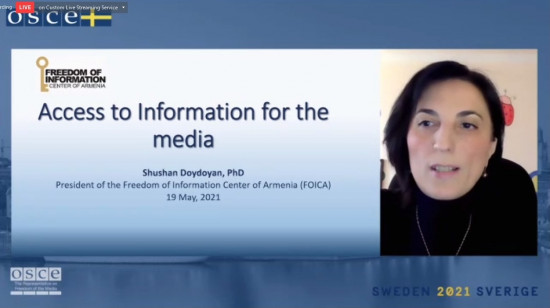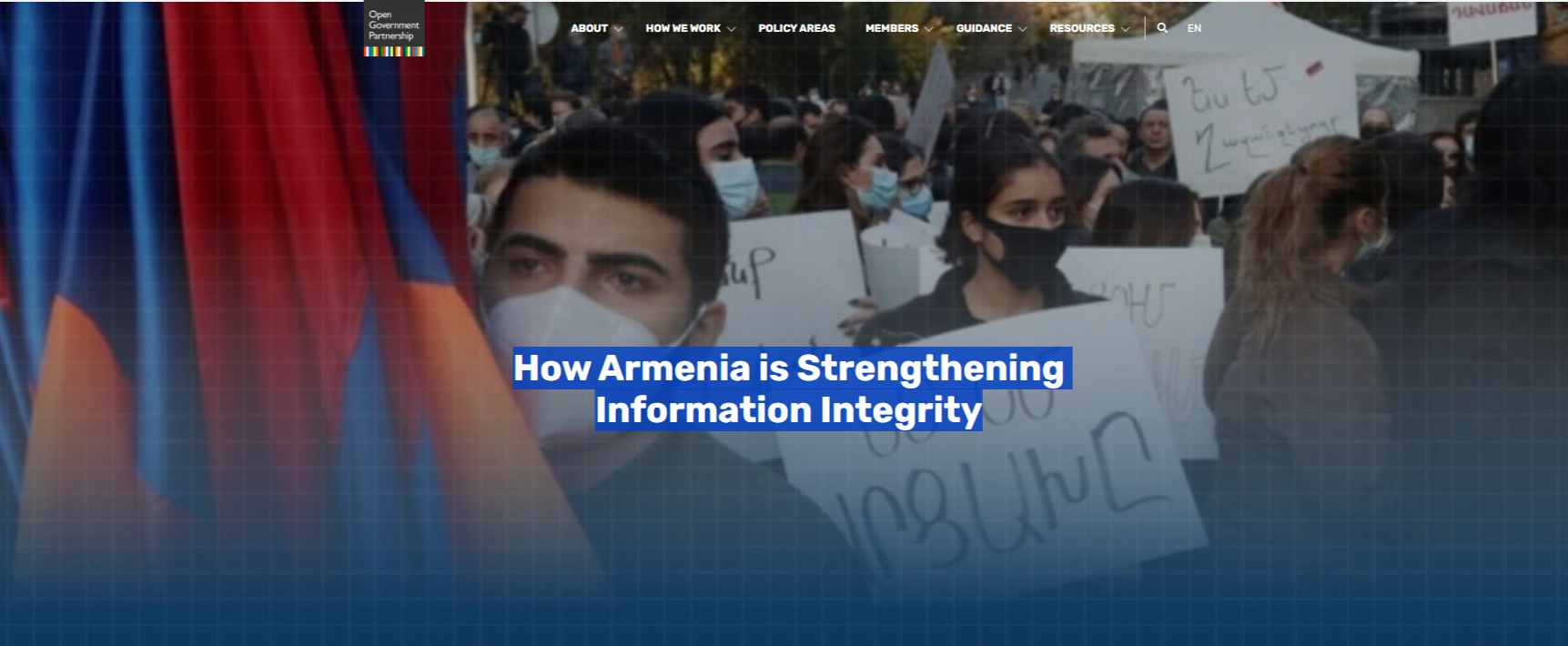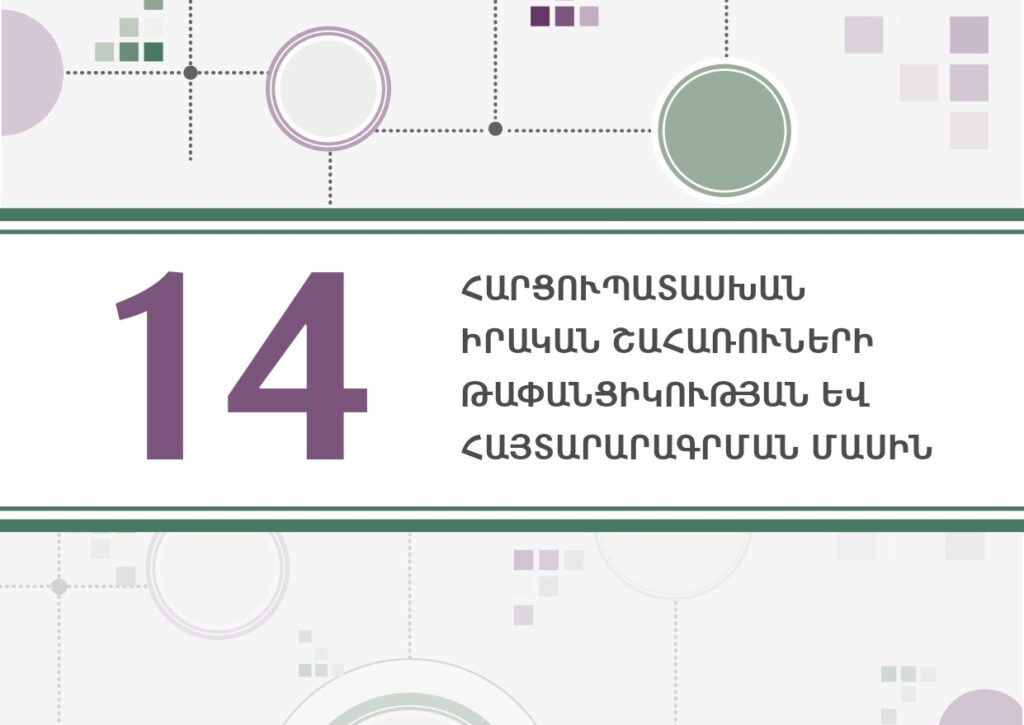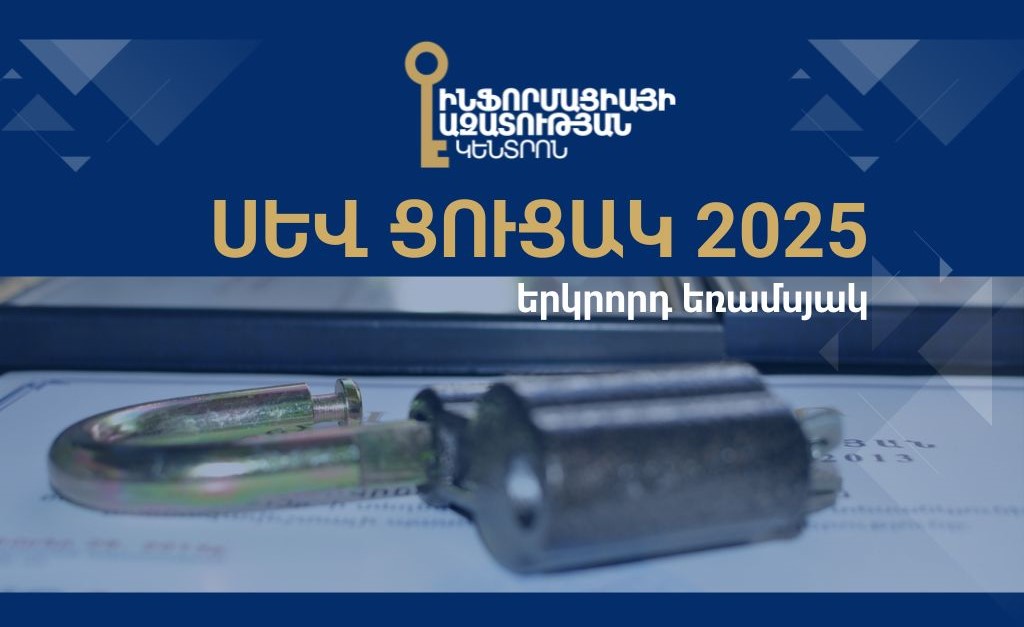FOICA president Ms. Doydoyan delivered a speech at the Stockholm Conference on Media Freedom in the OSCE Region on May 19. 2021.
Access to Information for the media
by FOICA president Shushan Doydoyan
It is my honor to speak at this important conference organized by 2021 Swedish OSCE Chairpersonship and the Office of the OSCE Representative on Freedom of the Media. Access to information is a key to protect journalists, to ensure accountability of the government and fight against disinformation. It’s a tool to fulfill CSO agendas, mission as well as become resilient towards new challenges we have faced since 2020.
Let me point out several key priority issues I find very important for the media:
1. The first priority for us is Access to information for the media
Indeed, disinformation became a major concern in Armenia and in other countries of OSCE region. Media are flooded with hate speech, disinformation and manipulations, especially in the post-war period and before the snap elections to be held in June in Armenia.
It is crucial that government provides maximum transparency to dispel rumours and keep the public and the media fully informed about ongoing developments and initiatives. Apparently, when a journalist does not receive timely and complete information, this creates favorable soil for the spread of disinformation. It is obvious that every poorly processed information request creates a basis for distrust towards the Government, as well as illegal limitations of access to information create a wide place for fake news and disinformation.
Thus, in my view, access to information is a key to make the fight against disinformation efficient and realistic.
To fulfill the fight against Disinformation FOICA organizes media literacy capacity development trainings for the youth, journalists as well as for public officials. It also submits thousands of information requests yearly addressed to the state agencies to get access to reliable information and widely publicizes it. Our requests disturb the government all the time and make it work transparently and openly. What the practice shows?
Response Time – Around 15% of information requests were delayed, violating the 5-day time frame set by the law. Although our observations confirm that late answers are not due to a tendency to hide information, but mainly because of the low quality of administration and lack of internal coordination, however late answers create an easy path for disinformation to flourish.
Channels for submitting information requests, especially during Covid outbreak are especially important. The Armenian government launched an electronic unified tool e-request.am to make the government-citizen communication possible and effective during the pandemic.
Let me note, last year the number of electronic requests was increased dramatically, from 54% in 2019 it reached to 91% in 2020.

Graph 1.
Content of answers – Complete response rate is 77% for 2020. It should be noted, however, that although the response rate was increased and the number of mute refusals was decreased, the vague or incomplete answers have significantly increased. In some cases, reporters receive answers which are so unclear and useless. And they can’t use that information for their stories. So the quality of official answers provided to the journalists is of utmost importance.
Grounds for denials: Data Protection vs. Access to information right of the media
It should be noted that the most commonly used ground for information refusal is privacy. (in 52% cases). This ground for refusal was applied more often than the state secret (in 39%).

Graph 2
There are situations where transparency benefits should prevail over the interest of protecting secrecy. This in particular is about cases where information concerns public officials and figures. It is very important that data protection legislation is not used as a shield hampering the disclosure of violations, abuses or frauds.
2. The second priority area that I would like to touch upon is the other part of ATI: Proactive transparency. Information requests and Proactive transparency can be used by everyone in the society to check accuracy of the news, their sources and intentions.
The FOICA observations show that proactive disclosure rules provided by the FOI law are not properly enforced by all public bodies, and the overall technical and content standards for posting information on official websites are not maintained. Although almost all government agencies run official FB pages, however their various web resources like FB or other social platform pages and the official web sites were not synchronized. Let me mention as well that gradually, FB is used more often than official web resources of the state agencies for public outreach purposes.
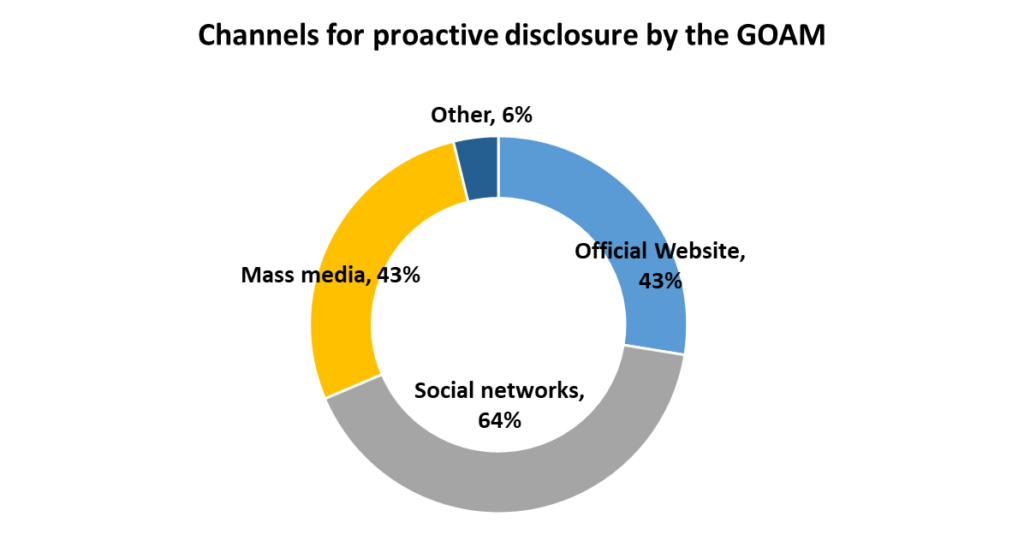
Graph 3:
Proactive provision of information about government activities will ensure higher public trust and confidence towards the state agencies and mobilize collective efforts for pandemic crisis management. At the same time, access to regularly updated data on official websites of public institutions ensures that journalists can easily obtain data and make their own analysis.
So my second conclusion is that Proactive disclosure of information and effective work with the media will lead to the decrease of disinformation and reinforcement of the public trust.
3. And finally, the third priority I would like to highlight is the transparency of the media ownership
As yesterday it was mentioned by Mr. Timothy Garton Ash, nowdays ownership controls the media.
How can people evaluate the reliability of information, if they don´t know who provides it? How can journalists work properly, if they don´t know who controls the company they work for?
Taking into account the predominant decline of public trust towards media, it is a common concern both for journalists and public at large. The public has the right to know who stands behind a media outlet. The public needs access to trustworthy information revealing basic identity data (name, activity, contact details, etc.) as well as all relevant information on ownership of the media.
The Arm Gov and civil society have been engaged in BO transparency issue right after revolution in 2018. Freedom of information Center together with other 2 CSOs came up with a recommendation to include a special commitment in the 4th OGP Action plan to launch BO process. Thus, we succeeded in leveraging the OGP action plan to advance the beneficial ownership transparency reforms in the country where the Government showed a high political interest and will for a progress in the field. The Gov fully completed the commitment by adopting necessary legislative package and designing and building an electronic public registry to collect, store and publish data on the Beneficial Ownership of companies. Now the government is expanding BO to involve all business sectors this year, including the media.
As a final note, in order to build back a strong and harmonic region, we first need to defend activists and journalists who serve as critical intermediaries, connecting public institutions and decision-makers with citizens. They inform and raise awareness as well as demand accountability of the governments. Protecting this essential watchdog role protects the people who use open government every day to create a change. The progressive world should be standing for its champions. And there should be clear signs for that. Not just declarations and promises, but clear signals and actions.
You can use these links to watch the Conferance Zoom recoding
- Stockholm Conference on Media Freedom in the OSCE Region – Day 1
- Stockholm Conference on Media Freedom in the OSCE Region – Day 2 (Doydoyan’s speech from 2:20 minute)
![]() Please find bellow the full text of the speech.
Please find bellow the full text of the speech.

